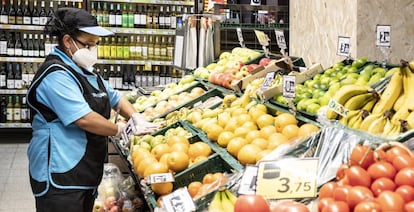How rising inflation is affecting Spain
According to new data, the hike in prices is being felt the most in categories such as housing expenses and transportation, but experts are optimistic it will fall in 2022

Prices in Spain rose 5.5% in November, according to data released Wednesday by the National Statistics Institute (INE). Although this was one tenth of a point lower than what had been forecast, the broader picture remains the same: inflation is at its highest level in 29 years, and it is rising faster than salaries can keep up with.
The November figure is the highest of the year, exceeding the 5.4% recorded in October. It has also had a big effect on the consumer price index (CPI), particularly in categories such as housing (+16.8%), which includes the cost of electricity, gas and water; transportation (+13.5%), which has been hit hard by rising fuel prices; food and non-alcoholic drinks (+3.3%) and hotels, cafés and restaurants (+2.5%).
Meanwhile underlying inflation, which does not take into account the cost of energy or fresh food – the most volatile elements – rose from 1.7% in November, up from 1.4% in October. Of Spain’s 17 regions, the Canary Islands saw the highest price spikes in November in annual terms, while Asturias was the only region to record a fall.
The INE announcement comes at an important time for business as the country heads into the Christmas season, when more is sold than at any other time of the year. It also coincides with skyrocketing energy prices: the cost rose to €304 per megawatt-hour (MWh) on Wednesday, the highest ever recorded. The energy crisis is being felt across Europe, with prices rising beyond the €300-mark in many countries, including France (€346 per MWh), Italy (€342 per MWh), Switzerland (€328 per MWh) and Austria (€312 per MWh).
In response to the rise, the Spanish government, which is led by a coalition between the Socialist Party (PSOE) and junior partner Unidas Podemos, announced that it was working on a new series of measures aimed at mitigating the impact of the soaring costs on households and small-to-medium enterprises. On Wednesday, Finance Minister María Jesús Montero told Spain’s lower house, the Congress of Deputies, that the government would extend tax cuts, introduced in September to curb electricity prices, for another four months.
Even so, at least four out of every 10 Spanish households (nearly 10 million) will pay more for electricity this year than in 2018, despite promises to the contrary by Prime Minister Pedro Sánchez in an interview with EL PAÍS on September 5.
Also on Wednesday, Spain’s National Road Transportation Committee (CNTC) held a protest in the streets of Madrid to call for action to address the crisis in the sector, which is struggling to cope with soaring fuel prices. The CNTC has called a three-day strike, between December 20 and 22, which the government is hoping to stop through negotiations.
Here is an overview of how inflation is affecting other sectors, according to the INE report.
Food and non-alcoholic drinks. This is the category that most contributed to the CPI rise in November. The price of all meat products rose, with the exception of pork, which fell slightly. The cost of lamb and goat meat jumped 6.9% with respect to October, while fish, seafood, milk, cheese, eggs, bread and cereal also increased, but at a lower rate. When compared to figures from last year, there is a sharp rise in products such as olive oil (+25.5%), lamb and goat meat (+15%), soft drinks (+10.5%), pasta and couscous (+10.3%), baby food (+7.2%) and fresh and chilled fruits (+6%).
Transportation. The cost of gasoline and diesel fuel rose 1.9% in November with respect to October. Compared to November 2020, prices for gasoline and diesel have jumped 29.4% and 32.8%, respectively. The rising cost of fuel, which in the case of Brent Crude has spiked 44%, has led to higher prices at gas stations.
Hotels, cafés and restaurants. The cost of hotels, hostels and other types of accommodation in November rose 24.2%, compared to the figure from the same month in 2020. With respect to restaurants and cafés, prices jumped 0.3%, compared to October, and 1.8% since the beginning of the year.
Housing. The cost of electricity in November fell 6.8% compared to October, but is still 46.7% higher than what it was in November 2020. The price of natural gas fell from last month but experienced a rise of 11.3% from a year ago, while liquid hydrocarbons, such as butane gas and propane gas, saw a monthly rise of 2.4% and an annual spike of 33.6%. The cost of household furniture has also risen 4.7% in a year.
Experts, however, are confident that inflation will start to fall next year. “There is light at the end of the tunnel: inflation is here to stay, but it will be significantly lower in 2022 and the following years than in 2021,” said Ignacio de la Torre, head economist at the financial firm Arcano.
Nieves Benito, the head of Fundamental Research at Spanish lender Santander’s asset management division Santander AM, added that the current situation is largely due to the impact of the coronavirus pandemic.
“In 2021, the lifting of [coronavirus] restrictions, the return of mobility and the reactivation of the economy created a perfect storm in which there was a significant imbalance between supply and demand,” she explained. “This led to unprecedented tension in the global supply chain and record levels of inflation not seen in the past decades. We are expecting that growth will slow, while remaining above the pre-Covid average. This, in addition to the gradual adjustment in the supply chain, should lead to a slow fall in inflationary pressures.”
Tu suscripción se está usando en otro dispositivo
¿Quieres añadir otro usuario a tu suscripción?
Si continúas leyendo en este dispositivo, no se podrá leer en el otro.
FlechaTu suscripción se está usando en otro dispositivo y solo puedes acceder a EL PAÍS desde un dispositivo a la vez.
Si quieres compartir tu cuenta, cambia tu suscripción a la modalidad Premium, así podrás añadir otro usuario. Cada uno accederá con su propia cuenta de email, lo que os permitirá personalizar vuestra experiencia en EL PAÍS.
¿Tienes una suscripción de empresa? Accede aquí para contratar más cuentas.
En el caso de no saber quién está usando tu cuenta, te recomendamos cambiar tu contraseña aquí.
Si decides continuar compartiendo tu cuenta, este mensaje se mostrará en tu dispositivo y en el de la otra persona que está usando tu cuenta de forma indefinida, afectando a tu experiencia de lectura. Puedes consultar aquí los términos y condiciones de la suscripción digital.









































